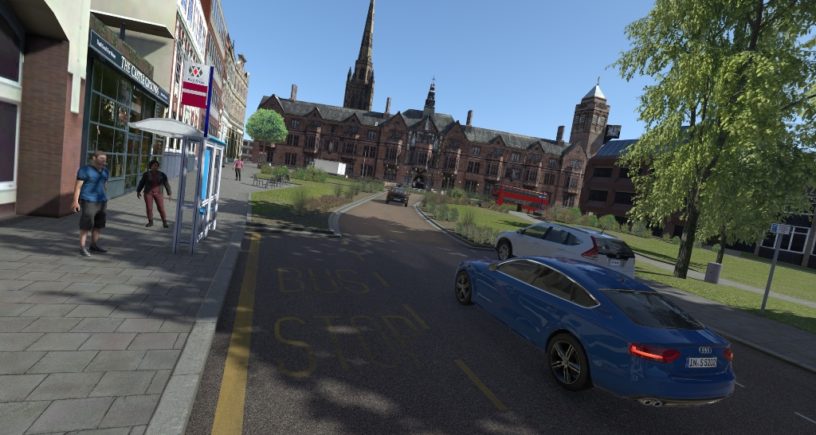For the first time, the transport industry will be able to accurately correlate simulated testing of autonomous vehicles on public roads in the UK. This paves the way for simulation to become a recognised part of the approval process for autonomous vehicles. This capability has been achieved thanks to a project between simulation software specialist rFpro and WMG, at the University of Warwick.
“You cannot feasibly validate autonomous vehicles in the real world alone, there simply isn’t enough time or money. We must also exploit the expandability of simulation,†said Matt Daley, rFpro Managing Director. “To do that we must trust the simulation results and so it is vital that we regularly check that they correlate with the real world. Our project with WMG enables the industry to do this on public roads for the first time in the UK. This is a big step towards the approval and adoption of autonomous vehicles.â€
rFpro has created a highly accurate digital-twin of sections of the Midlands Future Mobility testbed. While the model will enable the development of autonomous vehicles in simulation, WMG, alongside other Midlands Future Mobility partners, will provide testing and research support to allow customers to carry out effective real-world correlation.
There are currently three areas within the Midlands Future Mobility testbed that can be used immediately to accurately validate virtual test data on public roads; a road network around the University of Warwick campus, an area of Coventry town centre and a section of Holyhead Road, which is one of the main roads in and out of Coventry. These areas provide a varied selection of roads that are common across the UK. WMG and rFpro are already exploring phase two, with the aim of further extending the digital-twins to cover more of the Midlands Future Mobility route.
“We simulate, validate the results, exploit the simulation further, and then validate and exploit further again. Engineers have been using this technique for decades,†continued Daley. “For example, the first thing a Formula 1 team will do on a Monday after a race weekend is drive the simulator to verify that the simulated vehicle feel and data match the real vehicle feel and data. If the simulator correlates to the real world then they can quickly exploit the powers of their simulation before their next race. It is this same concept being used now to develop autonomous vehicles.â€
Importantly these real-world routes have the necessary infrastructure required for such autonomous vehicle testing and includes geo-fenced Closed Circuit TV, real-time kinematic corrected GPS and high-capacity wireless connectivity. This provides independently verified ground truth of the real-world event that is critical for correlation.
As part of the move towards simulation, WMG upgraded its 3xD simulator, including adopting rFpro’s software. The aim of the upgrades were to improve the visualisation observed by the driver, improve the realism of the vehicle model and continually consider new emulation techniques for sensors and signals, whilst having the open approach to minimise the time and effort to integrate these tools together. This will enable WMG to directly support users as they migrate from simulation to real-world testing.
WMG is a partner of Midlands Future Mobility which is funded by industrial partners and the UK Government’s Centre for Connected and Autonomous Vehicles as part of the wider Zenzic CAM Testbed UK initiative. It has a unique consortium of companies, including HORIBA MIRA, AVL, Transport for West Midlands, Costain, Amey, Wireless Infrastructure Group, Coventry University, Highways England, Vodafone and Immense. Midlands Future Mobility provides businesses with opportunities to trial a range of technologies, from Low Speed ‘shared space’ vehicles through to next generation Advanced Driver Assistance Systems (ADAS) and autonomous vehicle technologies. It aims to accelerate progress in Connected and Automated Mobility technology and infrastructure, establishing the UK’s presence in the global market, and contributing to its industrial strategy.
*Article Source http://www.rfpro.com/








